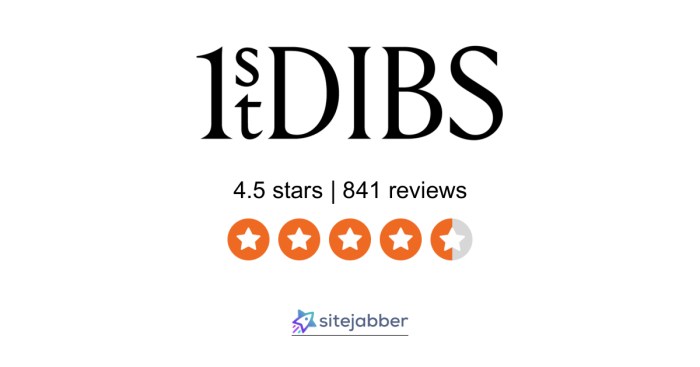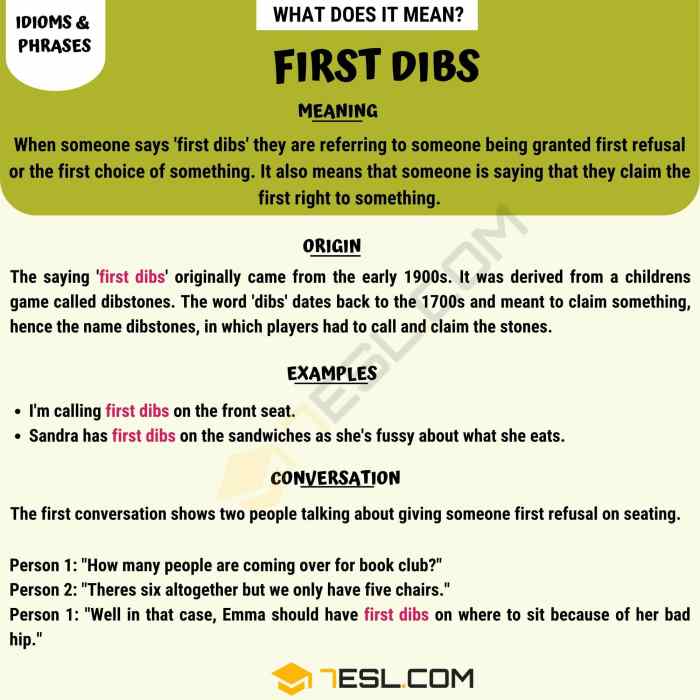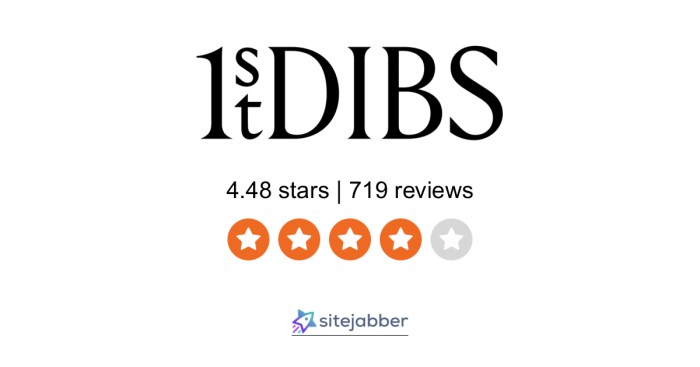1st dibss – 1st Dibs, a term deeply rooted in our collective lexicon, establishes a hierarchy of rights and privileges, shaping interactions and influencing outcomes across various spheres of life. This article delves into the origins, meaning, usage, and cultural significance of 1st Dibs, examining its ethical implications and exploring related concepts that intersect and complement it.
From its historical evolution to its contemporary applications, 1st Dibs has played a pivotal role in establishing order, fairness, and entitlement. Whether in personal relationships, business transactions, or social settings, the concept of having “first dibs” carries weight and influence.
Origin and History

The term “1st Dibs” originates from the concept of “first dibs,” which refers to the right or privilege of someone to choose or claim something before others.
Historically, the term has been used in various contexts, including games, sports, and social situations. In the game of marbles, for instance, the player who calls “1st Dibs” gets to choose the first marble to shoot.
Cultural and Regional Variations
The meaning and usage of “1st Dibs” can vary across different cultures and regions.
- In some cultures, the term is used primarily in a playful or informal setting, while in others, it may have more formal or legal implications.
- In certain regions, the term may be synonymous with “first refusal,” which refers to the right to be the first to accept or decline an offer.
Meaning and Definition
The term “1st Dibs” is a colloquial expression that denotes the right or privilege of having the first opportunity to choose or acquire something.
It implies that an individual has the precedence or priority in selecting or taking possession of an item or opportunity before others.
Common Usage
The concept of “1st Dibs” is commonly employed in various situations, including:
- Division of Resources:When a group of people need to allocate limited resources, they may establish a system where each person has “1st Dibs” on a specific item or portion.
- Social Interactions:In social settings, individuals may informally grant “1st Dibs” to others as a gesture of respect or to maintain harmony within the group.
- Sales and Negotiations:In business transactions, parties may negotiate “1st Dibs” on potential deals or acquisitions to secure a competitive advantage.
Usage and Applications: 1st Dibss
The term “1st Dibs” finds its way into various contexts, serving as a versatile expression that establishes priority or claims rights.
In personal interactions, it is commonly used to indicate the right of the first person to choose or take something. For instance, if friends are deciding on a movie to watch, the person who suggested it might claim “1st Dibs” on choosing the snacks.
Business Transactions
Within the realm of business transactions, “1st Dibs” holds significant weight. It can grant the first opportunity to negotiate or purchase a particular asset, property, or investment. In real estate, for example, potential buyers may express “1st Dibs” on a property, securing their position as the first in line should the seller decide to accept offers.
Social Settings
Social settings are not exempt from the influence of “1st Dibs.” It can be used to establish priority in social gatherings, such as claiming the first dance with a desired partner or securing the best seat at a table.
1stDibs is the leading online marketplace for authentic vintage and modern furniture, jewelry, fashion, and art. From antique cashmere sapphire rings to mid-century modern sofas, 1stDibs has something for everyone. With a vast selection of items from the world’s top dealers, 1stDibs makes it easy to find the perfect piece for your home or collection.
Cultural Impact
The concept of “1st Dibs” holds significant cultural sway in various societies, shaping norms and values around fairness, hierarchy, and entitlement. Its interpretation and application can vary across cultures, reflecting diverse social structures and beliefs.
Cultural Variations in Interpretation
- In some cultures, “1st Dibs” is strictly adhered to, granting the first person to express interest in something exclusive access to it. This emphasis on seniority and orderliness reinforces the value of respecting established norms and hierarchies.
- In other cultures, “1st Dibs” may be more flexible, allowing for exceptions or modifications based on factors such as age, status, or relationship. This approach reflects a more nuanced understanding of fairness, where individual circumstances are taken into consideration.
- In certain cultures, the concept of “1st Dibs” may not be as prevalent, with a greater emphasis on communal sharing or egalitarian principles. This suggests a different set of cultural values, where individual entitlements are less prioritized.
Related Concepts and Terms
The concept of “1st Dibs” shares similarities with other terms that establish precedence or advantage, such as “first come, first served” and “priority”.
First come, first servedis a principle that gives preference to those who arrive or act first. It is commonly used in situations where there are limited resources or opportunities, and it ensures fairness by allowing those who have waited the longest to have their needs met first.
Priority
Priorityrefers to the relative importance or urgency of a task, request, or person. It is often used to determine the order in which things are addressed or attended to. Priority can be assigned based on various factors, such as the potential impact, urgency, or the person’s status or authority.
These concepts intersect and complement each other in various ways. “1st Dibs” establishes an initial advantage or claim, while “first come, first served” ensures fairness in situations where there are multiple claimants. “Priority” helps to determine the order in which claims or requests are addressed, taking into account their relative importance or urgency.
Ethical Considerations

The concept of “1st Dibs” carries ethical implications that warrant examination. While claiming priority can provide certain advantages, it also raises questions about fairness and equity.
One potential ethical dilemma arises when individuals assert their “first dibs” without considering the needs or rights of others. This can lead to situations where those who are less assertive or less privileged are denied opportunities or resources.
Responsibility and Fairness
Individuals who claim “first dibs” have a responsibility to exercise their priority with fairness and equity. They should consider the potential impact of their actions on others and ensure that they are not excluding or disadvantaging others.
To promote fairness, it is important to establish clear and transparent rules for determining who has priority in different situations. This can help prevent disputes and ensure that everyone has an equal opportunity to access resources or opportunities.
Exceptions and Flexibility, 1st dibss
While respecting “first dibs” is generally considered ethical, there may be exceptional circumstances where it is appropriate to make exceptions. For example, if an individual has a pressing need or a compelling reason for requiring priority, it may be justifiable to consider their request.
Ultimately, the ethical use of “1st Dibs” requires a balance between respecting priority and ensuring fairness and equity. By considering the potential consequences of their actions and exercising their priority responsibly, individuals can ensure that this practice is used ethically.
Final Thoughts

In conclusion, 1st Dibs serves as a multifaceted concept that permeates our interactions, shaping our understanding of fairness, hierarchy, and entitlement. Its ethical implications and cultural variations highlight the complexities of establishing priority and claiming rights. As we navigate the nuances of 1st Dibs, it is essential to strike a balance between asserting our claims and respecting the rights of others.



